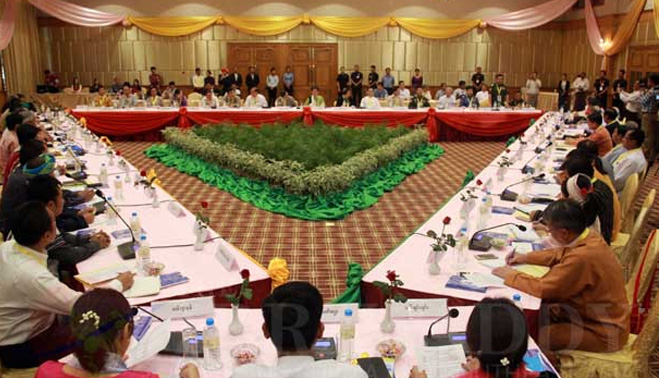![]() Home > Myanmar
Home > Myanmar
Peace Negotiator To Meet NCA Non-Signatories

UPDJC meeting in Naypyidaw last week. (Photo: Thiha Lwin / The Irrawaddy)
![]() May 31st, 2016 | 08:12 AM |
May 31st, 2016 | 08:12 AM | ![]() 1606 views
1606 views
BURMA
Government peace negotiator Dr. Tin Myo Win will meet with leaders of the ethnic armed organizations that did not sign 2015’s so-called nationwide ceasefire agreement (NCA) later this week in an effort to include them in the peace dialogue process.
A “Panglong-style” peace conference is scheduled to convene in July and the current National League for Democracy (NLD)-led government has been unclear as to which groups will be invited. Modeled after a 1947 summit convened in Panglong, Shan State by independence leader Aung San, the subsequent agreement signed between representatives of three of Burma’s ethnic minorities and the Burman majority has come to be seen by many as a rare symbol of inclusivity and interethnic cooperation in a country since plagued by civil war.
“We’d like to meet with every group, to include them in the process, if possible,” said Hla Maung Shwe, a member of the conference preparation committee and senior advisor to the Myanmar Peace Center, which oversaw the NCA. He added that Tin Myo Win wanted to meet with non-signatories as soon as possible, with whom Hla Maung Shwe and other representatives have been tasked with negotiating.
Continued active fighting throughout Burma has made it unclear whether groups that are currently clashing with the Burma Army will be included in the dialogue process. The Ta’ang National Liberation Army (TNLA), Myanmar National Democratic Alliance Army (MNDAA) and Arakan Army (AA) had all been excluded from talks by the previous government.
The NLD government has formed two sub-committees, one led by Tin Myo Win—personal physician to State Counselor and NLD party leader Aung San Suu Kyi—to negotiate with NCA non-signatories, and another led by Lt-Gen Yar Pyae of the Burma Army to take care of preparations for the conference.
These committees are part of the overarching Union Peace Dialogue Joint Commission (UPDJC), whose 48 members from Parliament, the Burma Army and the eight non-state NCA signatories are tasked with drafting the framework for political dialogue.
UPDJC chairwoman Suu Kyi said the peace conference would follow the foundation laid out by the former administration and be based on the current NCA, even though she has restricted some political parties from the process.
Burma has over 90 political parties and under the former government, UPDJC representatives could be selected from all of them. Suu Kyi has said that new representatives will only come from parties that hold elected seats in Parliament, while other parties will be able to voice their concerns through civil society forums.
“Some countries allow civil society groups to sit at the peace table, but others allow them to play a parallel role and express their concerns through forums. We will use the latter approach,” she said, adding that involving hundreds of civil society groups in peace negotiations would affect implementation of the process.
Source:
courtesy of THE IRRAWADDY
by Nyein Nyein
If you have any stories or news that you would like to share with the global online community, please feel free to share it with us by contacting us directly at [email protected]